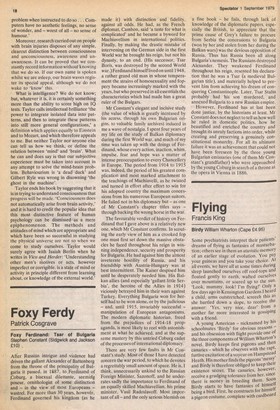Foxy Ferdy
Patrick Cosg rave
Foxy Ferdinand: Tsar of Bulgaria Stephen Constant (Sidgwick and Jackson £10) After Russian intrigue and violence had driven the gallant Alexander of Battenberg from the throne of the principality of Bulgaria it passed, in 1887, to Ferdinand of „Coburg. a bisexual dilettante, seemnig poseur, ornithologist of some distinction and — in the view of most Europeans — wastrel. For more than 30 years, however, Ferdinand governed his kingdom (as he made it) with distinction and fidelity, against all odds. He had, as the French diplomat, Cambon, said 'a taste for what is complicated' and he became a byword for Machiavellism in international politics. Finally, by making the drastic mistake of intervening on the German side in the first World war he brought his reign, but not his dynasty, to an end. (His successor, Tsar Boris, was destroyed by the second World war.)Ferdinand himself lived on until 1948, a rather grand old man in whose temperament the strains of homosexuality and foppery became increasingly marked with the years, but who preserved in all essentials the characteristics which had made him a great ruler of the Bulgars.
Mr Constant's elegant and incisive study (the value of which is greatly increased by his access, through his own Bulgarian origins, to valuable family archives) induced in me a wave of nostalgia. I spent four years of my life on the study of Balkan diplomacy during the first World war, and much of my time was taken up with the doings of Ferdinand. whose every action, inaction, whim, impulse, fear and hope was a matter of intense preoccupation to every Chancellery in Europe. The period from 1914 to 1915 was, indeed, the period of his greatest complication and most marked attachment to the teachings of Machiavelli, as he twisted and turned in effort after effort to win for his adopted country the maximum concessions from his numerous European suitors. He failed not in his diplomacy but — as one of Mr Constant's chapter titles says — through backing the wrong horse in the war.
The favourable verdict of history on Ferdinand that I gave above is a relatively new one, which Mr Constant confirms. In scouting the early view of him as a crooked fop one must first set down the massive obstacles he faced throughout his reign in winning independence, security and prosperity for Bulgaria. He had against him the almost inveterate hostility of Russia, and his friendship with Austria-Hungary was at best intermittent. The Kaiser despised him until he desperately needed him. His Balkan allies (and especially 'gallant little Serbia', the heroine of the Allies in 1914) viciously betrayed him in their wars against Turkey. Everything Bulgaria won for herself had to be won alone, or by the judicious — and, until 1915, invariably successful — manipulation of European antagonisms. The modern diplomatic historian, freed from the prejudices of 1914-18 propaganda, is most likely to reel with astonishment at what he achieved, and at the supreme mastery by this untried Coburg cadet of the processes of international diplomacy.
There are very few faults in Mr Constant's study. Most of those I have detected concern the war period, to which he devotes a regrettably small amount of space. He is, I think, unnecessarily unkind to the Russian Foreign Minister. Sazonoff, and he underrates sadly the importance to Ferdinand of an equally skilled Machiavellian, his prime minister, Vasil Radoslavoff. Most important of all — and the only serious blemish on a fine book — he fails, through lack of knowledge of the diplomatic papers, especially the British, to appreciate that the prime cause of Grey's failure to procure from Serbia the concessions to Bulgaria (won by her and stolen from her during the Balkan wars) was the devious opposition of Russia. Thus has Russia been all along Bulgaria's nemesis. The Russians destroyed Alexander. They weakened Ferdinand throughout his reign, resented his declaration that he was a Tsar (a medieval Bulgarian title), and materially helped to prevent him from achieving his dream of conquering Constantinople. Later. Tsar Stalin probably had his son murdered, and annexed Bulgaria to a new Russian empire. However, Ferdinand has at last been done justice, by the historians at least. Mr Constant does not neglect to tell us how well he ruled in domestic politics, how he beautified and enriched the country and brought its unruly factions into order, while creating and preserving a genuinely constitutional monarchy. For all its ultimate failure it was an achievement that could not have been foreseen by the three young Bulgarian emissaries (one of them Mr Constant's grandfather) who were approached by the young Coburg in search of a throne at the opera in Vienna in 1886.






























 Previous page
Previous page